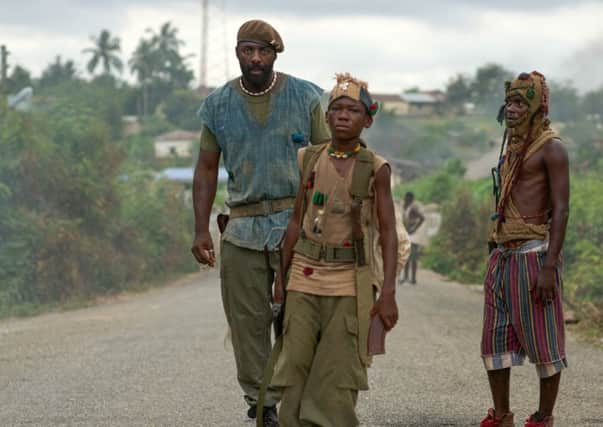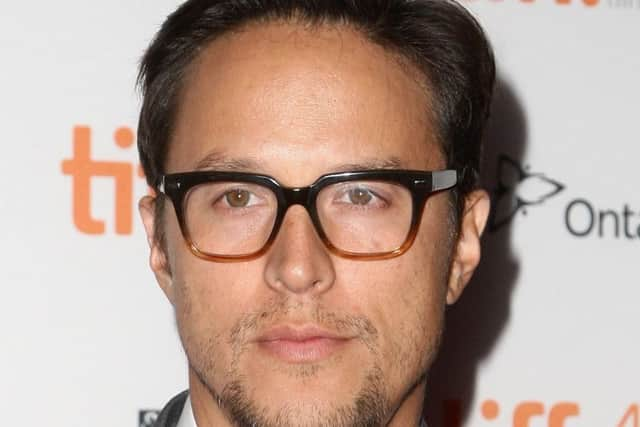Cary Fukunaga on his harrowing war film, Beasts Of No Nation


MOST of us are familiar with the photographs of child soldiers with rifles hanging from slender shoulders that appear in newspapers and magazines. And few can be unaware of the horrific 21st-century twist that Isis has put on the phenomenon, by posting videos on the internet of children performing executions. If anyone doubts that kids are being inured to violence from a tender age by the group, they only need to watch the footage of a toddler using a combat knife to behead his teddy bear for chilling proof.
What these images don’t tell us, though, is anything about the children’s subjective experience. How do they feel? What understanding do they have of their actions? What does killing do to them psychologically and emotionally? These are the kinds of questions that fuel Beasts Of No Nation, the harrowing, brutal and beautiful new film from Cary Fukunaga, who last year won an Emmy as the director of all eight episodes of the first season of True Detective. Here he takes on writing, directing and camera-operating duties.
Advertisement
Hide AdThe gripping war movie, Netflix’s first foray into feature film-making, sees the Californian addressing the subject of conflict that has fascinated him since before becoming a film-maker.


“Violence is such a major part of our programming,” he says. “Whether you’re driving your car down the road and experience road rage, or any number of things where that anger bubbles to the surface, it sort of belies the idea that we are civilised, that our animal selves don’t dominate or control our unconscious state.”
When Fukunaga was 14, he wrote a 60-page civil war epic. He later studied history and political science at university, with a focus on geopolitics and conflicts in neocolonial countries that helped pave the way for Beasts Of No Nation.
“I became aware of the wars over conflict resources in the 90s,” he says, “when the war in Sierra Leone [where the use of child soldiers was widespread] was taking place. So I have been interested in this subject for a long time.”
Fukunaga entered film school in 2002 with a treatment for a film about child soldiers and blood diamonds. But it wasn’t until a friend gave him a copy of Uzodinma Iweala’s novel, Beasts Of No Nation, three year’s later, that he found a way into the subject.
It’s the story of Agu – a young boy who joins a rebel militia group under the leadership of the Commandant after becoming separated from his family during a conflict in a West African country – and the novel explores the harrowing experience of an ordinary, happy youngster who is transformed into a killer from a child’s perspective. Iweala stripped away everything that one might have imagined Fukunaga would be interested in (for example, politics), and focused purely on Agu’s journey.
Advertisement
Hide Ad“The book doesn’t say which country, what war, what the war’s about, which is one of the reasons I love it,” says the director. “But when you have to execute it as a movie, you have to provide a lot more detail that fills in the screen.”
Fukunaga had shot films in Sierra Leone and Liberia, and used research from those projects to contextualise the film in Ghana, where it was made. Even so, the movie also does not specify a country. The feeling that this is a universal story is heightened by the casting. Fukunaga picked youths (nearly all non-actors, including some real former child soldiers) from places as far apart as Sierra Leone, Cameroon and Nigeria, so multiple languages are spoken. He also lifted political iconography from different places. “There’s a few references in there, if you look for them. But there’s nothing that would say any one particular nation state.”
Advertisement
Hide AdTwo of the film’s coups are casting Idris Elba as the complex Commandant character, and Abraham Attah, the Ghanaian son of a roadside water seller, as Agu. The latter catches the boy’s loss of innocence, despite never having acted before. (He won the Best Young Actor Award at last month’s Venice Film Festival.)
“Idris was the first and only choice, and I didn’t think he would say yes,” says Fukunaga. To be effective, Commandant, whom he based on a rebel leader he’d met in Haiti called Dred Wilme, had to be sympathetic and, ultimately, tragic. “So I needed somebody that is inherently likeable, charismatic, and could also pull off all the savagery and violence that not only he does but he makes his men do, effectively, realistically, believably.” Elba delivered, giving arguably his greatest performance to date.
Fukunaga does not whitewash the violence of the conflict. And just when you hope that Agu will stop himself falling over the edge, he commits a brutal act that is almost unwatchable. On set, though, the kids were having a blast. For them it was like a game, insists Fukunaga. “It is violent when you see it, but in the moment when you are actually doing it, you would never guess how violent it is.”
Nevertheless, he admits that there were concerns about including former combatants from Liberia in re-creations of warfare, because of the possibility of “triggering traumatic psychological responses”.
However, if Joshua Oppenheimer’s Indonesian genocide documentary, The Act Of Killing, told us anything, it is that the opposite is often true. Like the grinning killers in that film, one youth from Monrovia “had no problem re-enacting stuff, and actually really enjoyed it,” says Fukunaga. “[He] admitted that he missed killing. And sometimes when he got angry he wished he could kill again, like he did during the war, because there’s a power in that. The problem is you can never use those guys on camera, because they’re smiling the entire time.”
Some of them were “much more damaged” by their experience, Fukunaga concedes. “The guys I was speaking to don’t necessarily have access to psychological analysis, nor are they necessarily asking themselves the same sort of Freudian questions we ask ourselves every morning when we get up. So their version of what happens, sometimes, can be very simple and just moving on with their lives.”
Advertisement
Hide AdSome have questioned whether a film like Beasts Of No Nation can do anything to prevent children going to war. Other than adding to our awareness, Fukunaga is doubtful. “The issue of child soldiers is actually the way in which conflict is waged now,” he says. “Children work around the world and now that kind of warfare is its own form of industry. It’s another way of making a living.”
Children don’t just join a group like Boko Haram in Nigeria for religious or ideological reasons, but because they get $1,400 to sign up for a year. “So I would say it’s a population or a workforce that doesn’t have jobs until the conflict comes there.”
Advertisement
Hide AdThe way to end the need for child soldiers, Fukunaga suggests, is to find a way to end the kinds of conflicts that exploit them – easier said than done. n
Twitter: @grubstreetsteve
• Beasts Of No Nation is on selected release, and will be available on Netflix from Friday